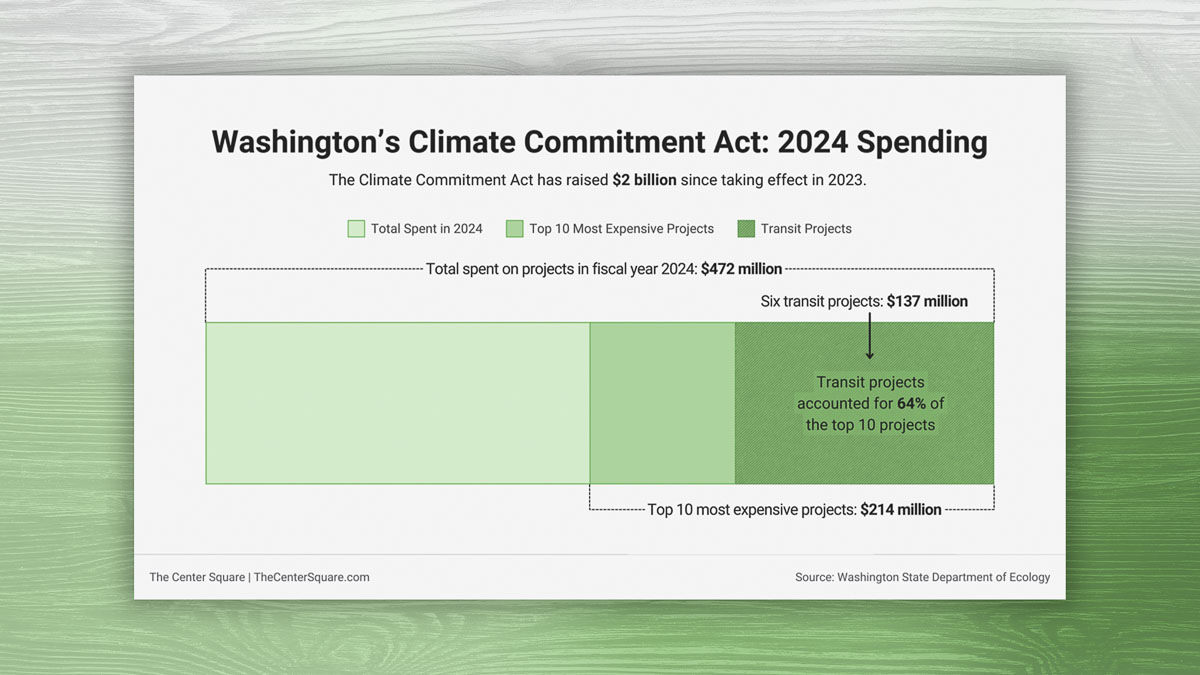
As of the most recent report by the Department of Ecology, in the fiscal year 2024 almost half of all CCA revenue spent originated from an account designated specifically for transit related projects
TJ Martinell
The Center Square Washington
Washington drivers may be funding transit when they fill up their vehicles at the gas pump due not only to how carbon auctions under the Climate Commitment Act could be indirectly raising gas prices, but how CCA money has been appropriated by the state Legislature.
As of the most recent report by the Department of Ecology, in the fiscal year 2024 almost half of all CCA revenue spent originated from an account designated specifically for transit related projects.
One source of debate over a proposed RUC program is whether or not the revenue should be restricted to state highway projects in the same way as gas tax revenue. Some have advocated maintaining that restriction on any RUC money, while others believe it should be flexible enough to fund other transportation areas such as transit.
Under the CCA, Ecology holds quarterly carbon auctions in which emitters subject to the law must purchase carbon allowances; according to Ecology, those auctions have generated more than $2 billion in revenue so far.
Organizations like the Washington Policy Center and the Washington Farm Bureau have argued that the carbon auctions have caused gas prices to increase as a result. A former economist for the Washington State Department of Transportation claimed in 2023 that he was told by higher ups to falsify the impact of the CCA on gas prices and filed a lawsuit as a result.
Meanwhile, an analysis by The Center Square of CCA projects funded in the fiscal year 2024 found that of the top 10 most expensive projects, six of them were transit related. The most expensive CCA funded project during that time frame was also for transit; the $66 million project was to “support ongoing operations costs to maintain and provide bus service” in Seattle.
In total, $137 million or 64% of the $214 million spent on the top 10 most expensive projects were for transit projects. That $137 million represents 30% of the $472 million in total CCA spending for the fiscal year 2024.
CCA revenue is deposited into three accounts, two of which have sub accounts, respectively. The revenue is held in those accounts until the money is appropriated by the state Legislature.
Of those four subaccounts, money spent from the Climate Transit Programs Account on 115 projects constituted $213 million or 45% of all CCA project spending in the 2024 fiscal year.
According to Ecology, spending from that subaccount focuses on the following:
- Transit support grants
- Tribal transit mobility grants
- Transit coordination grants
- Special needs transit grants
- Bus and bus facility grant programs
- Green transit grants
- Transportation demand management grants
- Other transit projects identified in an omnibus transportation appropriations act
The Center Square recently reported that although the CCA’s primary objective is to reduce carbon emissions, almost 90% of total project spending in the 2024 fiscal year involved no emission reductions, and those that did reduced total state emissions by .3% “over time.”
Of the top 10 most expensive projects, only two were reported to reduce emissions. Of those two projects, only one reported actual emission reduction; that $9.7 million project converted three Jumbo Mark II ferry vessels to hybrid-electric, reducing emissions by 6,510 metric tons.
This report was first published by The Center Square Washington.
Also read:
- Belkot speaks before C-TRAN board; directors pause vote on light rail funding language until JulyMichelle Belkot spoke at Tuesday’s C-TRAN board meeting, calling her removal from the board unlawful; directors postponed a vote on light rail funding language until July amid legal challenges.
- Travel Advisory: Expect delays on northbound I-5 near RidgefieldWSDOT is warning travelers to expect delays near Exit 14 on northbound I-5 in Ridgefield as crews begin barrier and lane improvement work supporting future development.
- Large crowd expected at C-TRAN Board of Directors Meeting Tuesday, April 15A large turnout is expected at the April 15 C-TRAN board meeting, where public input and a key vote on light rail funding will follow the recent removal of Michelle Belkot.
- Letter: ‘The IBR needs a more cost-effective design’Bob Ortblad argues the I-5 Bridge replacement project is overbudget and inefficient, urging a more cost-effective tunnel alternative to avoid excessive tolls and taxpayer burden.
- Clark County beginning installation of upgraded traffic signals in mid-AprilClark County will begin upgrading multiple traffic and pedestrian signals in mid-April to improve safety, accessibility, and transportation technology.









